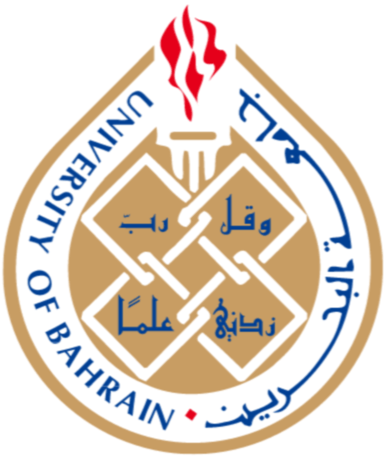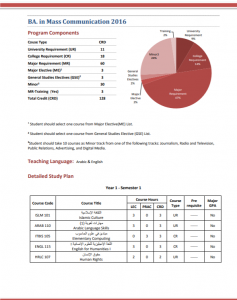PROGRAM LEVEL
The BA in Mass Communication is a four-year and 128 credit program encompassing several tracks, including print media, digital media, radio and television, public relations and advertising. These tracks and their corresponding courses are based on contemporary media topics and issues, ensuring thoughtful, up-to-date, and creative learning environments.
The department’s specialized faculty is dedicated to cultivating students’ skills and talents through coursework and activities that focus on new technology and digital communication. Concurrently, faculty commitment to the theoretical foundation, including communication theories, ethical issues, media regulations, and media impact on society, is vital. Students thus work to implement and produce complete practical projects to fulfil their media training within the department.
The program thereby increases the likelihood of students’ successfully accessing opportunities after graduation in various media organizations, both private and governmental. They are also subsequently encouraged to pursue a master’s degree in communication.
ABOUT THE PROGRAM
DETAILED STUDY PLAN
- Study Plan 2023 (PDF, 0.5 MB , 11 Pages)
PROGRAM OBJECTIVES
The BA in Mass Communication aims to:
1. Provide students with the basic knowledge and practical skills in the field of media and communication with an emphasis on the latest trends, theoretically and practically.
2. Encourage creative and advanced projects in the various fields of media and communication.
3. Develop the student critical thinking skills through the scientific research and the projects he/she carries out throughout his/her academic career.
PROGRAM INTENDED LEARNING OUTCOMES
Students who hold a bachelor’s degree in Mass Communication should be able to:
a) To write various forms of media in the areas of journalism, public relations, advertising, radio, television and the Internet.
b) To produce and present programs on radio and television.
c) To produce and creatively design media content using new media and multimedia applications.
d) To manage media institutions and public relations in the public and private sectors, and plan media campaigns.
e) To design and launch marketing and advertising campaigns.
f) To employ emerging communication and information technologies in the field of media and communication.
g) To gain proficiency in the basic media concepts and theories, in Arabic and English.
h) To undertake scientific research in the field of media and communication.
i) To commit to media work ethics, and apply them in accordance with local and international charters and conventions.
j) To use Arabic and English communication skills in dealing with superiors and colleagues, while respecting societal values.










